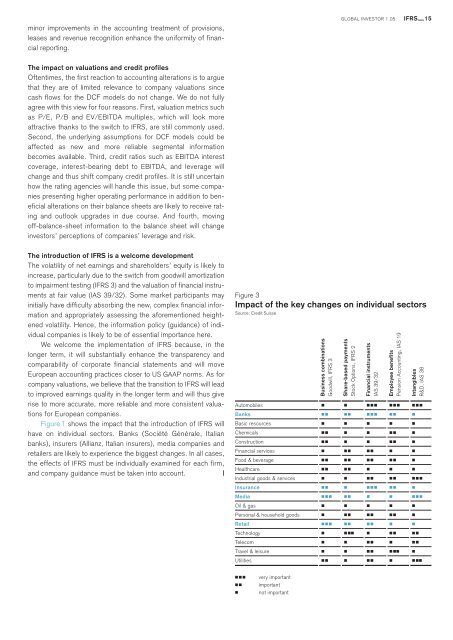You also want an ePaper? Increase the reach of your titles
YUMPU automatically turns print PDFs into web optimized ePapers that Google loves.
minor improvements in <strong>the</strong> accounting treatment of provisi<strong>on</strong>s,<br />
leases and revenue recogniti<strong>on</strong> enhance <strong>the</strong> uniformity of financial<br />
reporting.<br />
GLOBAL INVESTOR 1.05 IFRS— 15<br />
The impact <strong>on</strong> valuati<strong>on</strong>s and credit profiles<br />
Oftentimes, <strong>the</strong> first reacti<strong>on</strong> to accounting alterati<strong>on</strong>s is to argue<br />
that <strong>the</strong>y are of limited relevance to company valuati<strong>on</strong>s since<br />
cash flows for <strong>the</strong> DCF models do not change. We do not fully<br />
agree with this view for four reas<strong>on</strong>s. First, valuati<strong>on</strong> metrics such<br />
as P/E , P/B and EV/EBITDA multiples, which will look more<br />
attractive thanks to <strong>the</strong> switch to IFRS, are still comm<strong>on</strong>ly used.<br />
Sec<strong>on</strong>d, <strong>the</strong> underlying assumpti<strong>on</strong>s for DCF models could be<br />
affected as new and more reliable segmental informati<strong>on</strong><br />
becomes available. Third, credit ratios such as EBITDA interest<br />
coverage, interest-bearing debt to EBITDA, and leverage will<br />
change and thus shift company credit profiles. It is still uncertain<br />
how <strong>the</strong> rating agencies will handle this issue, but some companies<br />
presenting higher operating performance in additi<strong>on</strong> to beneficial<br />
alterati<strong>on</strong>s <strong>on</strong> <strong>the</strong>ir balance sheets are likely to receive rating<br />
and outlook upgrades in due course. And fourth, moving<br />
off-balance-sheet informati<strong>on</strong> to <strong>the</strong> balance sheet will change<br />
investors’ percepti<strong>on</strong>s of companies’ leverage and risk.<br />
The introducti<strong>on</strong> of IFRS is a welcome development<br />
The volatility of net earnings and shareholders’ equity is likely to<br />
increase, particularly due to <strong>the</strong> switch from goodwill amortizati<strong>on</strong><br />
to impairment testing (IFRS 3) and <strong>the</strong> valuati<strong>on</strong> of financial instruments<br />
at fair value (IAS 39/32) . Some market participants may<br />
initially have difficulty absorbing <strong>the</strong> new, complex financial informati<strong>on</strong><br />
and appropriately assessing <strong>the</strong> aforementi<strong>on</strong>ed heightened<br />
volatility. Hence, <strong>the</strong> informati<strong>on</strong> policy (guidance) of individual<br />
companies is likely to be of essential importance here.<br />
We welcome <strong>the</strong> implementati<strong>on</strong> of IFRS because, in <strong>the</strong><br />
l<strong>on</strong>ger term, it will substantially enhance <strong>the</strong> transparency and<br />
comparability of corporate financial statements and will move<br />
European accounting practices closer to US GAAP norms. As for<br />
company valuati<strong>on</strong>s, we believe that <strong>the</strong> transiti<strong>on</strong> to IFRS will lead<br />
to improved earnings quality in <strong>the</strong> l<strong>on</strong>ger term and will thus give<br />
rise to more accurate, more reliable and more c<strong>on</strong>sistent valuati<strong>on</strong>s<br />
for European companies.<br />
Figure1 shows <strong>the</strong> impact that <strong>the</strong> introducti<strong>on</strong> of IFRS will<br />
have <strong>on</strong> individual sectors. Banks (Société Générale, Italian<br />
banks), insurers (Allianz, Italian insurers), media companies and<br />
retailers are likely to experience <strong>the</strong> biggest changes. In all cases,<br />
<strong>the</strong> effects of IFRS must be individually examined for each firm,<br />
and company guidance must be taken into account. |<br />
Figure 3<br />
Impact of <strong>the</strong> key changes <strong>on</strong> individual sectors<br />
Source: Credit Suisse<br />
Business combinati<strong>on</strong>s<br />
Goodwill, IFRS 3<br />
Share-based payments<br />
Stock Opti<strong>on</strong>s, IFRS 2<br />
Financial instruments<br />
IAS 39/32<br />
Employee benefits<br />
Pensi<strong>on</strong> Accounting, IAS 19<br />
Automobiles <br />
Banks <br />
Basic resources <br />
Chemicals <br />
C<strong>on</strong>structi<strong>on</strong> <br />
Financial services <br />
Food & beverage <br />
Healthcare <br />
Industrial goods & services <br />
Insurance <br />
Media <br />
Oil & gas <br />
Pers<strong>on</strong>al & household goods <br />
Retail <br />
Technology <br />
Telecom <br />
Travel & leisure <br />
Intangibles<br />
R&D, IAS 38<br />
Utilities <br />
<br />
<br />
<br />
very important<br />
important<br />
not important

















